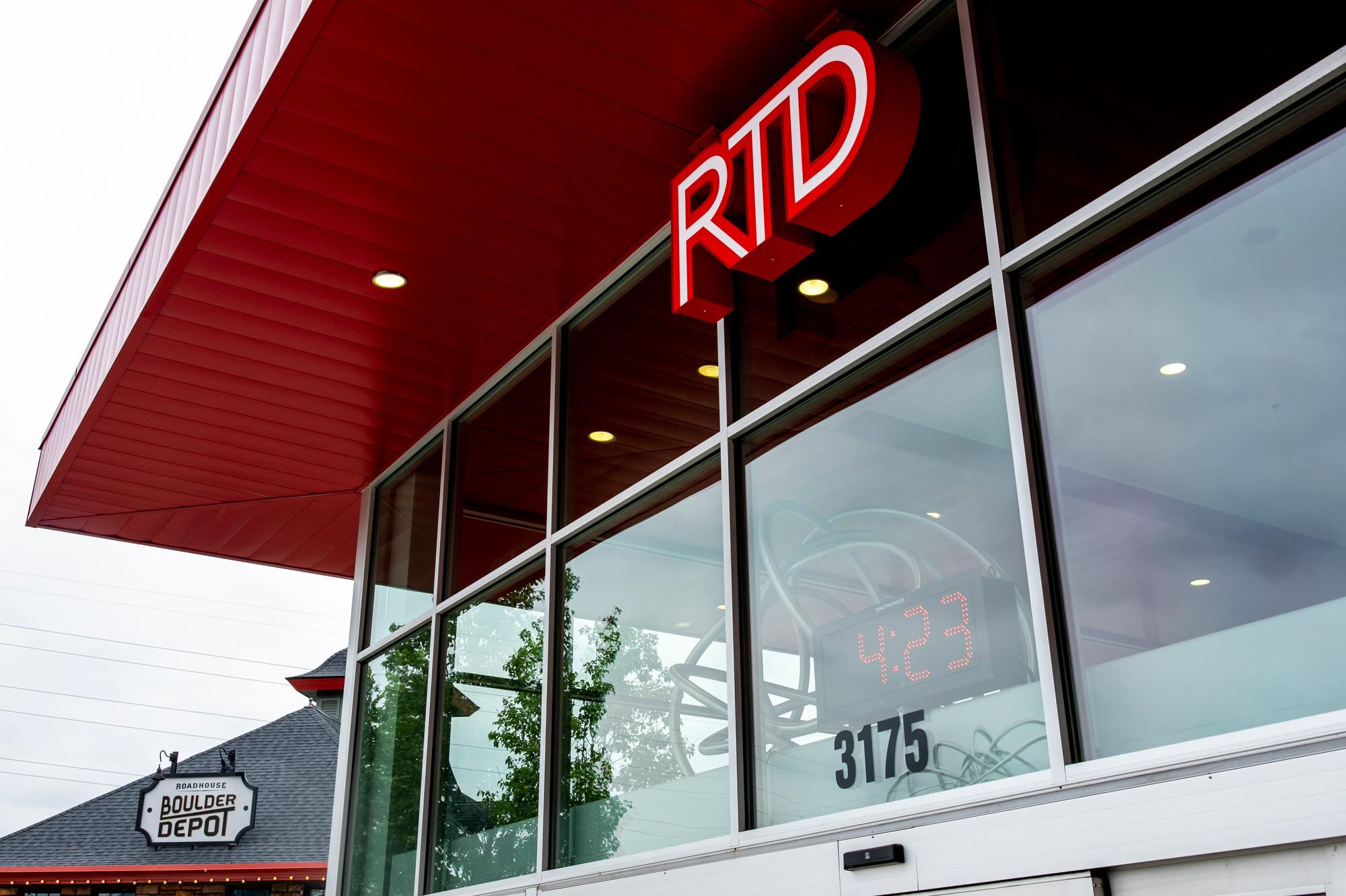
Nearly 90 minutes into the Regional Transportation District board’s Tuesday night meeting on the unfinished commuter rail line to Boulder and Longmont, RTD board chair Angie Rivera-Malpiede interrupted.
“I want to welcome Gov. Polis,” she said. “We know how busy you are and are pleased you accepted our invitation to join us.”
The governor’s unusual appearance at an RTD board meeting came after Polis took issue with recent comments by RTD’s new CEO and General Manager Debra Johnson, who questioned the wisdom of the B Line project that has seen its cost triple to at least $1.5 billion and ridership estimates drop by about half. The volley ended with Johnson inviting Polis to join Tuesday’s meeting for an “open and transparent dialogue” about the line.
“I’m excited that the board is doing a deep dive into how RTD can meet this commitment made to voters,” Polis began.
RTD made the commitment in 2004 when voters approved the massive FasTracks expansion project, agreeing to tax themselves an extra four pennies on a $10 purchase to fund more than 100 miles of new passenger rail and improved bus service.
RTD has completed about 70 percent of those projects, and because of higher-than-expected costs and lower-than-expected revenues, does not have the money to finish the remaining lines until the 2040s. That’s led some advocates and board members to say that RTD should focus instead on different, more cost-efficient projects that could achieve similar goals.
Polis spoke for about 10 minutes, making it clear that he expected RTD to prioritize the unfinished FasTracks lines, with the B Line on the top of that list, above all other projects. RTD, which is facing long-term budget challenges, says it will cost more than $2 billion to do that.
“It's really essential, of course, that we uphold the will of the voters, find a way to move forward, before looking at other projects,” Polis said. “Which you, as individual directors, may feel you want more. But this is about fulfilling the existing promises made to taxpayers in 2004 before we can really look at new horizons."
'On a tightrope'
After brief comments from Rivera-Malpiede and Johnson, Polis left the call. In a phone interview on Thursday with Rivera-Malpiede, I observed that the meeting did not appear to contain much discussion between Polis and the board.
"No, there wasn't. There wasn't,” she said. “And, you know, all I can do is extend an invitation to sit at the table and hear the same information we're hearing. He is the governor of the state. He is the leader, and I'm hoping that he will really take a look at this with us to develop a strategy as we move forward in good faith. Now, that's all I can ask, right? Because ultimately it's his decision."
I also asked Rivera-Malpiede whether the governor’s focus on one particular project — which happens to serve his city of residence, Boulder — comes at the expense of the greater needs of the Denver metro region that RTD serves.
“That's kind of a loaded question,” she replied. “I don't want to piss him off. I'm like on a tightrope here. I really want this to be a proactive movement in terms of RTD saying, 'You know what, we are extending our hand in friendship and in collaboration, let's work together to figure out a solution together.'”
Polis also suggested that RTD apply its most recent federal COVID relief grant of about $200 million toward the B Line project. RTD says that money will go toward payroll and the operation of its current system, as the federal legislation said it should.
Polis’ suggestion irked Shontel Lewis, who represents northeast Denver on the RTD Board.
“It's also unethical. And it's also a slap in the face to us as an agency,” Lewis said, noting that the agency had planned for hundreds of layoffs, salary cuts, and sustained service reductions until the federal money came through. “It's a comment that I think has been really disconnected from all the decisions that we've been making as an agency.”

RTD staff have said that, during the pandemic, ridership has fallen severely on the downtown commuter-focused rail network while it’s stayed relatively steady on bus lines that serve transit-dependent passengers and minority communities. The governor’s comments ignored that, Lewis said.
"Quite frankly, it's disappointing to see the governor pushing, and utilizing his position of power, to, in some ways, bully us into doing something that would yield inequities in our transit system,” she said.
Lewis said Polis, as governor, could do more to divert state money toward the B Line project. She said while others have been privately critical of the governor, she feels a need to speak out and keep a focus on RTD’s most transit-reliant passengers.
“While it's scary to be on this island, that's fine,” she said. “If that means that folks will never elect me into another position again, because I fought for those who are most oppressed and marginalized. That's totally okay with me.”
In a statement Friday afternoon, Polis press secretary Conor Cahill reiterated many of the points the governor made earlier in the week including his main one: RTD must fulfill its 2004 promise to taxpayers lest voters’ trust in government be eroded.
“We look forward to RTD’s plan on how to proceed with fulfilling its FasTracks commitments to voters by building out the NW Rail and other corridors, including modeling new ridership numbers that reflect the demands and preferences of Coloradans today,” he wrote, in part.
Meanwhile, RTD staff are working on next steps.
Johnson, RTD’s CEO, told the board Tuesday that her staff would present a plan for how to move forward within 60 days. Many board members from the northwest region said Tuesday they supported paying for new planning work.
"This is the right moment to do this,” said Lynn Guissinger, who represents Boulder County on the RTD board. She noted that other entities, including the state of Colorado are working on rail projects that could benefit the B Line. “If we sit on the sidelines, we won't have a voice in these decisions.”
Guissinger said Friday she appreciated Polis' efforts to raise the priority of the B Line, and noted that a member of Polis' policy staff was present for the entire meeting Tuesday.
At least one local elected official, Boulder County Commissioner Matt Jones, commended Polis and other elected officials, for “championing this issue.”
“RTD needs to keep its NW Rail promise to voters, and soon,” he tweeted. “Together we can get this done--the little engine that could!”
The state-convened accountability committee is working on recommendations for how RTD could resolve the unfinished FasTracks projects. Co-chair Elise Jones said Friday those are a “work in progress.”
That discussion should keep a focus on minority communities, said Deyanira Zavala, the executive director of transit advocacy group Mile High Connects who also sits on the accountability committee.
“These are the folks that are riding transportation,” she said. “So the question that I have is, as we’re looking at the northwest rail, how are we keeping these folks in mind? Are they the ones that are being served by the northwest rail? If not, are there other options that we could look at, like bus rapid transit, that we know move people and still get us the same outcome?”
Other RTD board members say if the agency is going to prioritize the B Line, it shouldn’t forget the other unfinished FasTracks rail lines, nor the increase in bus service that FasTracks was supposed to fund. That’s since been diverted into a savings account to be used for rail projects like the B Line.
“If you want to use the word promise, that was also promised to voters,” said board member Peggy Catlin of Jefferson County. “That has fallen by the wayside.”








